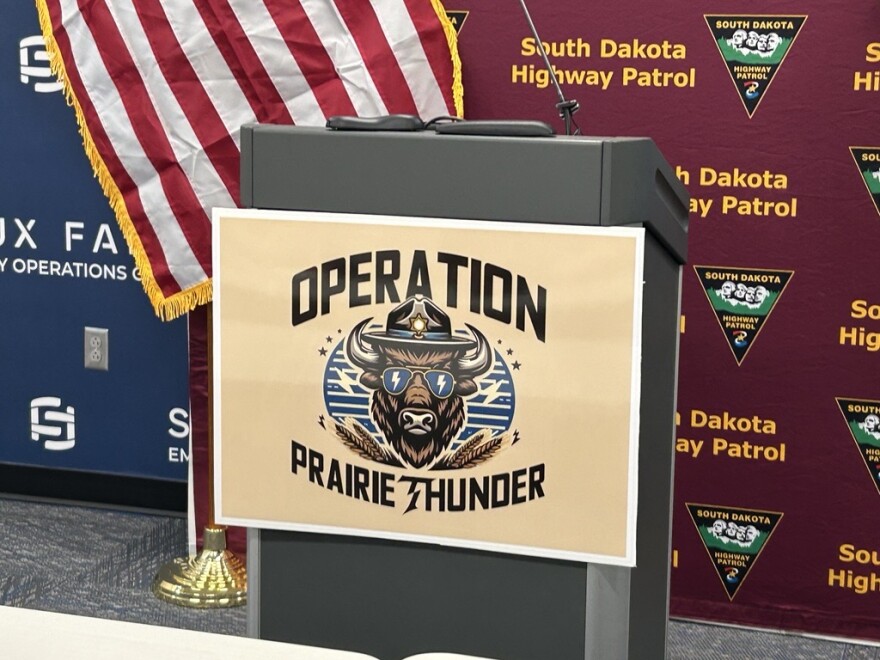As part of Operation: Prairie Thunder, the state Board of Pardons and Paroles is transferring 10 undocumented immigrants serving prison time to ICE custody.
Gov. Larry Rhoden said state taxpayers shouldn’t “have to foot the bill for illegal alien criminals.”
State officials said inmates were first identified by the Department of Corrections based on immigration status, low-risk classification and proximity to sentence completion. Each case was then reviewed under the Parole Board, and now to be transferred to US ICE custody for deportation proceedings.
It's made possible through a 287(g) agreement Rhoden coordinated between DOC and ICE, officials said.
“This cooperation between DOC and ICE is uncharted and takes a bit of extra coordination, so I appreciate the Parole Board’s swift action to get illegal alien criminals out of our custody and out of our country," Rhoden said. "I trust President Trump, Secretary Noem, and the hard-working law enforcement agents of Border Patrol and ICE to keep these individuals from returning to our communities.”
The inmates that were paroled for deportation include:
- Jose Sanchez #78283, Mexico, multiple counts of Possession Controlled Substance (Schedule I & II);
- Yahia Hassan #77076, Sudan, multiple counts of Possession Controlled Substance (Schedule I & II), 3rd Degree Burglary, and Receiving/Transferring Stolen Vehicle;
- Patrick Morris #78412, Liberia, Grand Theft < $2,500 and 1st Degree Burglary;
- Dustin Buffalo #73336, Canada, Reckless Burning and Aggravated Assault;
- Mohammed Kromah #69826, Liberia, Aggravated Assault;
- Victor Pacheco #72401, Mexico, Aggravated Assault, and Possession of a Weapon in Jail;
- Deng Ayom #69779, Sudan, Discharge of Firearm at Occupied Structure;
- Mustafe Hamud #57019, Somalia, Distribution of Controlled Substance (Schedule I & II);
- Miguel Caveda Perez #77916, Cuba, 4th Degree Rape; and
- Bereket Mekonnen #77412, Ethiopia, 2nd Degree Burglary, Possession Controlled Substance (Schedule I & II), and Receiving/Transferring Stolen Vehicle.
This comes as the second major event in the past week in which officials cited the initiative.
In a press release, Rhoden’s office said a drug bust in Sturgis, that found over 200 lbs. of meth, demonstrates the need for Operation: Prairie Thunder. Alonso Molina Corona, a California man originally from Mexico, is accused of transporting the drugs but pleaded not guilty to the charges.
A spokesperson for the governor’s office said Molina Corona was in the country legally at the time of the arrest, but “he is now subject to immigration proceedings” due to federal statute. If convicted, he would be deported.
On whether Operation: Prairie Thunder impacted the bust, Rhoden said, “I don’t know that there was anything different. I think this was a demonstration of some very competent law enforcement officers."
However, he said the initiative is a way to take advantage of competent law enforcement in the state, like the ones on the drug bust.
“To have inter-governmental law enforcement agencies working together and then we add a little muscle to it with adding resources like air assets, whether it’s the Highway Patrol’s plane or the Lakota helicopters from Rapid City whose primary mission is drug interdiction," Rhoden said. "To bring that to bear in an area like Sioux Falls where they’re experiencing great growth, I think has the potential to yield great results.”
Operation: Prairie Thunder has two parts. The first is a targeted anti-crime initiative in the Sioux Falls metro area. After a five-month period, Rhoden said he and the experts will reassess if it’s been a success and should be expanded into other communities in the state.
The second is a comprehensive effort to support Immigrations Customs Enforcement in border control and deporting undocumented immigrants. That includes multiple 287(g) agreements, including with the DOC and Highway Patrol.
Critics of the program say it builds mistrust in immigrant communities and diverts local law enforcement time and resources to ICE priorities.


